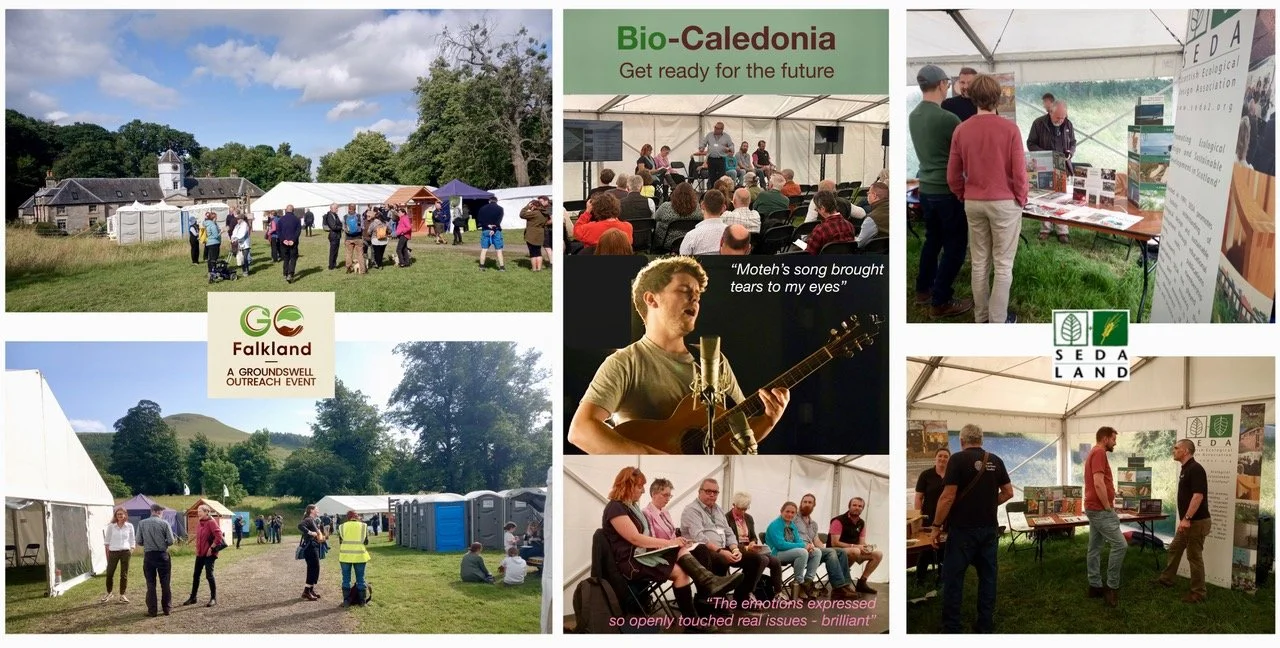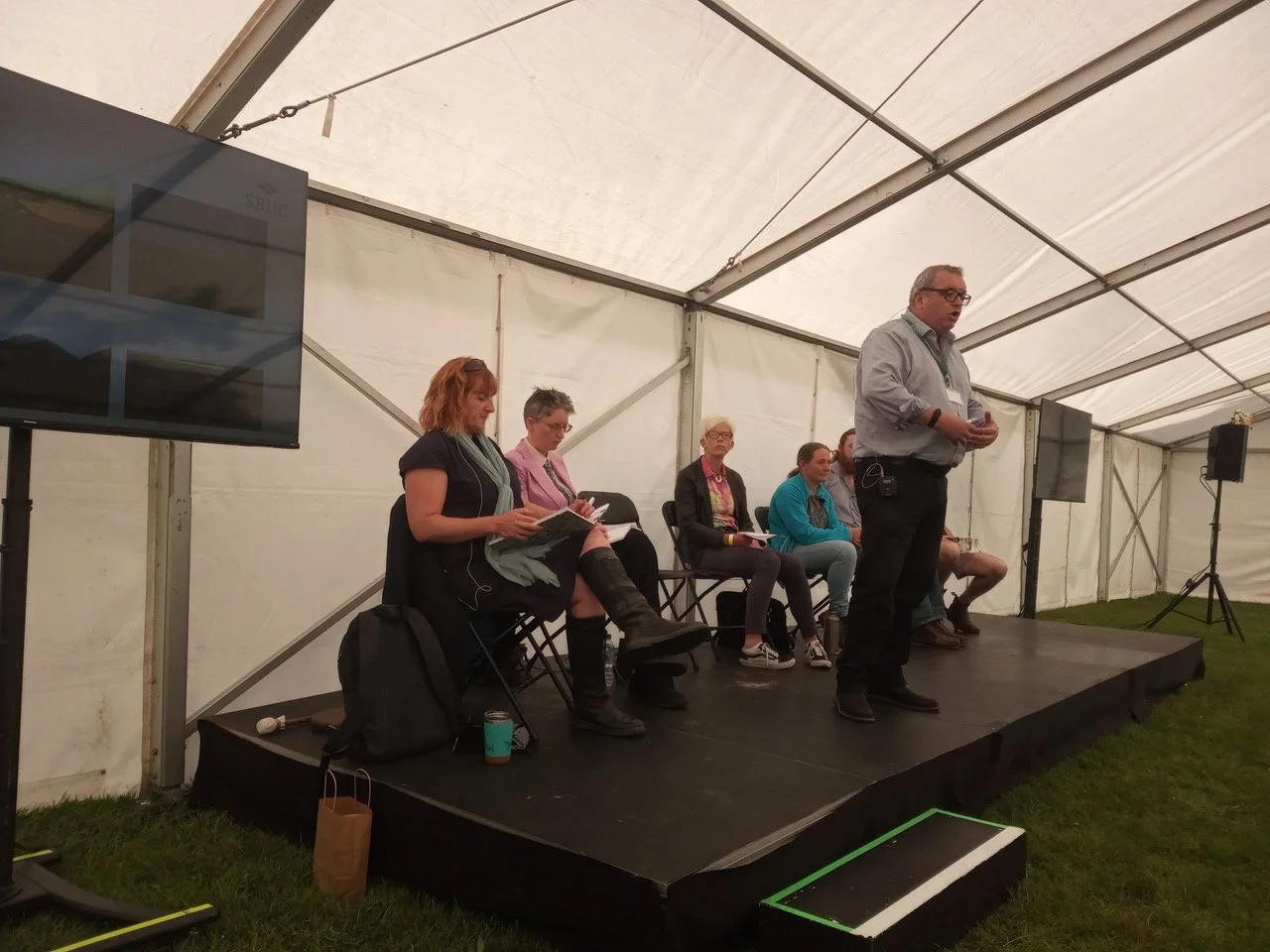A Farming Revolution
Photographs by Gail Halvorsen.
By Gail Halvorsen, 20 June 2023
When I was walking down the burn that crosses Bamff estate in north-east Perthshire in the pouring rain looking for beavers, dressed like Christopher Robin with a gigantic umbrella and wellington boots, I had no idea that my host would spark one of the most impassioned contributions to the SEDA Land event at GO Falkland the following day.
The company hosted at Bamff House that evening were as international as the beavers that were reintroduced from Norway, Poland and Bavaria. There was a French film crew sheltering under the dripping trees and a Transylvanian songwriter. However we never saw the beavers because they, unlike us, have more sense than to come out in the rain.
GO Falkland was the first ever outreach event of Groundswell – the regenerative farming conference that’s been held annually at Lannock Manor Farm in Hertfordshire since 2016. It started with a few hundred attendees and has grown into the largest regenerative farming gathering in the UK, attracting over 7,000 this year.
Although Falkland did not reach those numbers, there was a real buzz at the event. A wide variety of people interested in the land and food production enjoyed a full day of talks, exhibits, food and culture in glorious sunshine.
“I don't think I’ve ever seen so many smiling farmers,” said Ninian Stuart, organiser of GO Falkland and steward of Falkland estate – the beautiful and bucolic setting for the event on the 1st July.
SEDA Land ran one of the events in the main tent – “Bio-Caledonia” – a conversation about the Scottish Government’s ambitious new strategy to halt biodiversity loss by 2030 and reverse it by 2045, goals that will require transformational change. As agriculture uses 70 per cent and forestry 20 per cent of land in Scotland, farmers, foresters and land managers will need to fully integrate new biodiversity management into their existing approaches. The science is clear – all farming systems must become regenerative.
Davy McCracken, professor of agricultural ecology at the SRUC, who sits on the Scottish Government's Scottish Biodiversity Advisory Group, set out the context of the biodiversity crisis and, along with a panel of farmers, foresters and a landscape planner (see poster for full list) covered how the new targets can be met on the ground, both from biodiversity perspective and to help land managers make appropriate changes.
The debate afterwards was dominated by two themes – ‘share versus spare’ and how to bring sceptical farmers on board.
Johnnie Balfour, owner of the neighbouring Balbirnie Home Farms, suggested landowners who are already farming regeneratively should open their doors and show people firsthand how it is done. He also said we need to dispel the myth that intensive farming is more profitable. After the initial two to three year conversion period, regenerative farming produces healthier soils which in turn produce higher-yielding crops and higher incomes.
I was surprised at the emotions generated by the “share versus spare” argument – a hotly debated subject amongst landowners at present. It was Sophie Ramsay, my host at Bamff, and poet, who gave a powerful and emotional plea for more integrated land management and the realisation that landowners need an income…
Photograph by Gail Halvorsen.
“Land sharing” is land management which attempts to meet both agricultural and conservation needs within the same area. This includes reducing pesticide and fertiliser use and retaining habitat features such as trees, hedges and ponds. “Land sparing”, on the other hand, involves measures to sustainably increase yields on some areas of agricultural land, allowing other areas of land to be set aside and protected for nature conservation such as SSSIs.
When Moteh Parrot sang "A Song To Insects” about the declining number of insects hitting our car windscreens, one senior researcher in the audience was reduced to tears.
SEDA Land also had a stall in the exhibitors’ tent at GO Falkland, ably manned by Geoff Squire, formerly of the James Hutton Institute and architect and SEDA member Elliot Payne. Our new banners were marooned in a depot in Southampton, but my Heath Robinson-esque boards made out of cornflake packets and Sellotape did the job.
There was a stream of inquisitive people passing, showing an interest in the only stand not directly related to farming.
Increasingly, Scotland’s farmers and land managers are turning away from the post-war, intensive farming consensus, which has had, and indeed continues to have, such disastrous consequences for soil health, groundwater purity and biodiversity across rural Scotland. Events like the original Groundswell in Hertfordshire, and Groundswell Outreach in Fife, are already playing a critical part in this movement. There is no question that, from the evidence at Falkland, there is a groundswell movement to change things.


